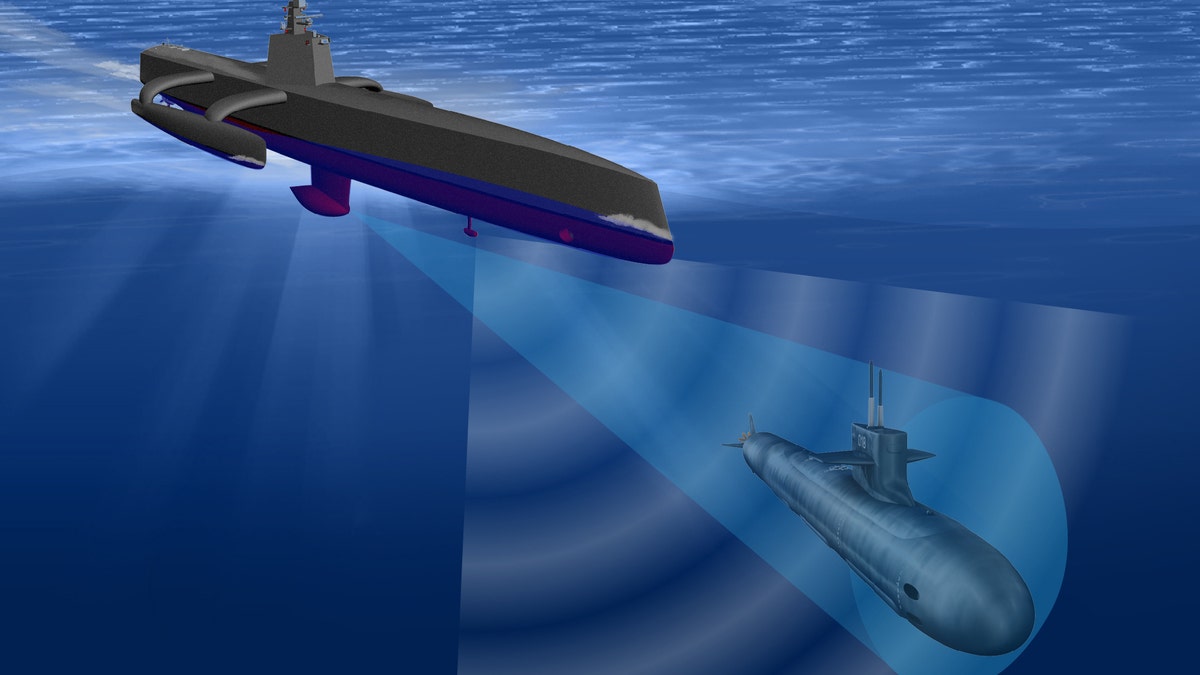
Artist's concept of ACTUV (DARPA).
A new vessel will patrol the world’s oceans hunting and tracking enemy submarines – and it will execute missions without a single human aboard.
The Defense Advanced Research Projects Agency (DARPA) that pioneers tech for the US military, created the Anti-Submarine Warfare Continuous Trail Unmanned Vessel (ACTUV) program. Reston, Va.-based company Leidos is working with the agency to develop the groundbreaking ship.
On Tuesday DARPA tweeted a picture of ACTUV being prepared for sea trials in the spring.
From concept: https://t.co/A2buvNq9DP to prototype -- this is ACTUV today, being prepped for sea trials this spring. pic.twitter.com/CsNQYmVl6S
— DARPA (@DARPA) February 16, 2016
Without a human crew, this drone vessel will be able to execute important missions independently like tracking and trailing an enemy sub over thousands of miles – not just for a day or two, or even a few weeks – this drone could hunt the enemy for months.
Related: Drone swarms join the Navy
The ACTUV enemy submarine hunter is expected to be about 130 feet long. DARPA has announced that it will be revealed for the first time on April 7 when it will also be christened in Portland, Oregon.
In addition to hunting enemy subs, ACTUV will be capable of a wide range of missions, such as reconnaissance and counter-mine deployments. It could also be useful to resupply troops.
What’s the threat?
The rise of tough-to-detect and track diesel electric submarines poses a significant challenge to the U.S. Navy. ACTUV is designed to excel at tracking these ultra-quiet subs.
Diesel-electric submarines come at a relatively cheap price point of about $250 million, while giving their owners the advantage of stealthy movements beneath the surface due to their virtually silent engines.
Related: Historic aircraft carriers in pictures
How quiet is quiet? Reports suggest that some of these subs can be 15 decibels more quiet than a humpback whale.
Iran claims to have fleets of these sneaky subs.
How ACTUV will be a game changer
Enter ACTUV, which could roam the oceans for thousands and thousands of miles executing missions.
For next level tracking, the vessel will be armed with state-of-the art sensors allowing it to detect the quietest of enemy subs. The idea is that it will be nearly impossible for a hostile sub to slip the ACTUV when the unmanned vessel is on its tail.
Related: Israeli company Elbit Systems showcases robot warship
Despite being smaller than traditional subs, the ACTUV will be able to achieve speeds that exceed diesel electric propulsion submarines - and for a fraction of the cost.
ACTUV will have “logic” that allows it to not just identify other vessels, but also predict how they will behave. The sub hunter will be so smart that it should be able to interact, counter and outmaneuver manned enemy vessels.
It will be able to run operations as part of a team with other unmanned vessels operating beneath the water and on the surface. The sub hunter could also work in cooperation with manned vessels.
And get this – ACTUV is designed to figure out and comply with maritime laws, such as regulations to prevent collisions.
Related: Air Force, Marines, bolster air power with major Super Hercules deal
When ACTUV enters service, it will give the U.S. military a range of advantages. Rather than send out a destroyer or a nuclear sub, ACTUV could be deployed, freeing up those assets and keeping costs down.
ACTUV will offer lots of versatility, such as launching from and returning to a pier – rather than having to deploy from a ship like other UUVs (Unmanned Underwater Vehicles). ACTUV will also give the Navy a vessel with far better endurance. It will also be able to carry far more weight than lots of the drone surface vessels launched from ships.
What’s Next?
After the big reveal in April, ACTUV will continue to be tested and refined.




















